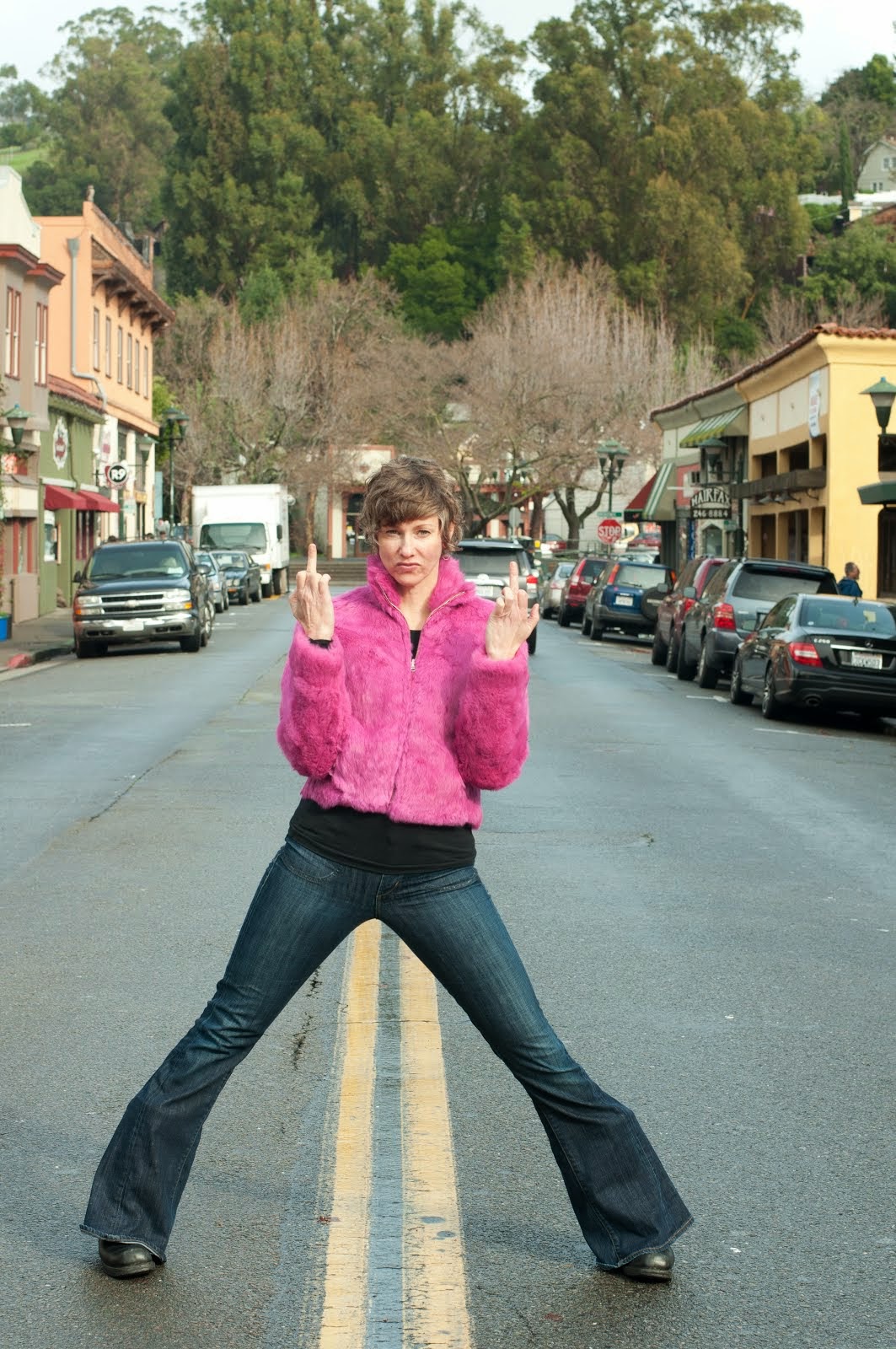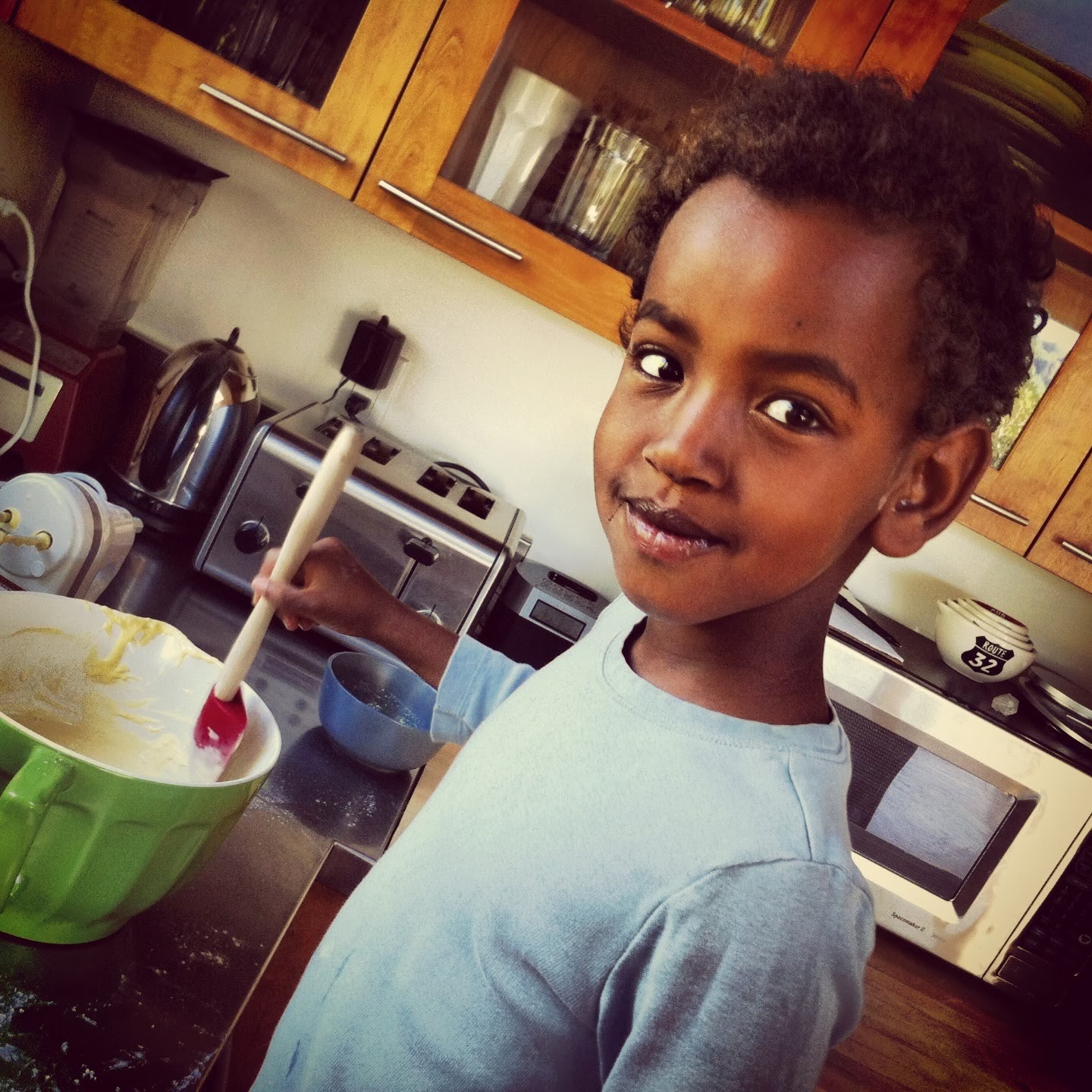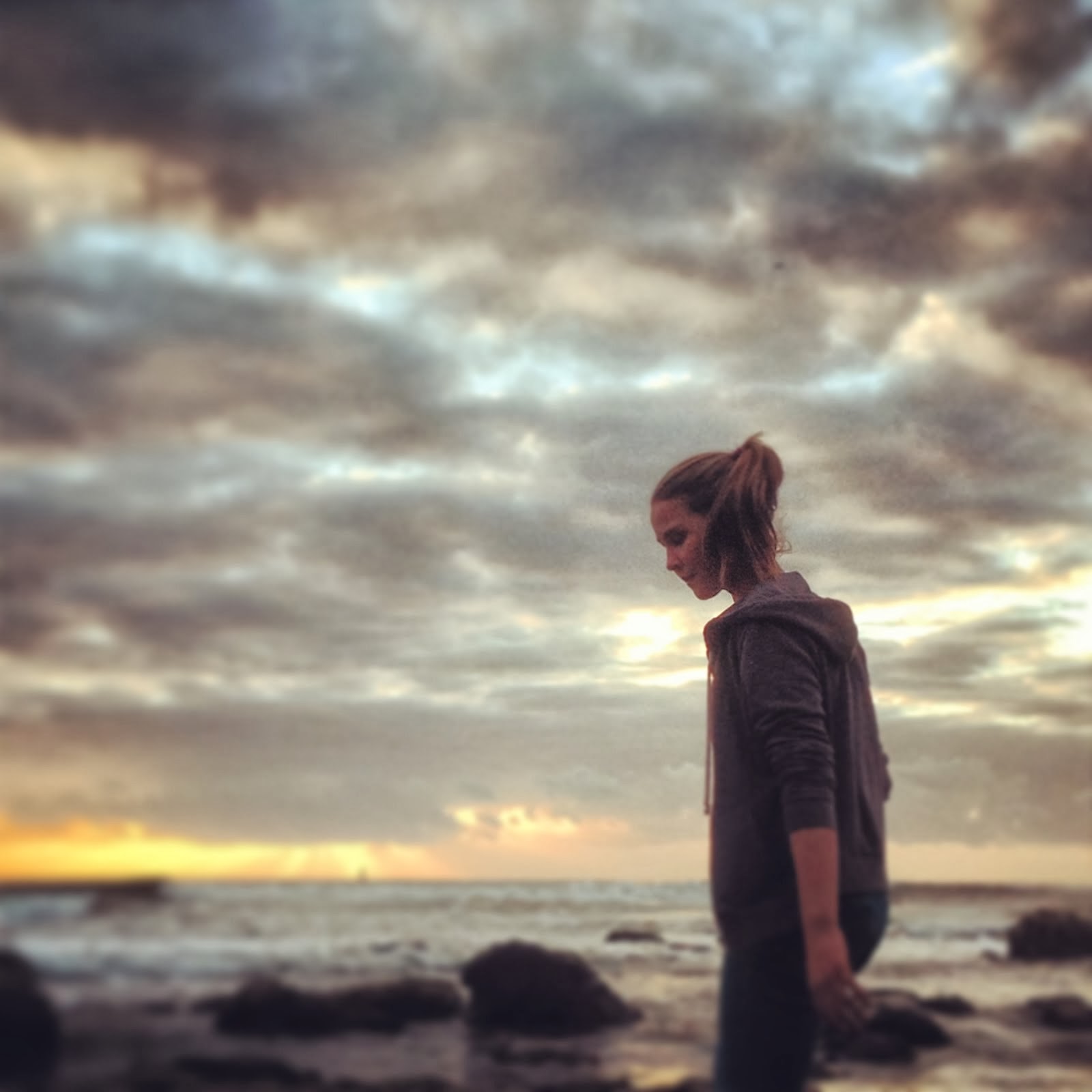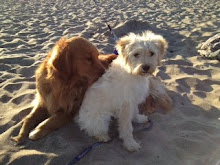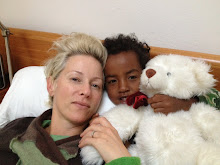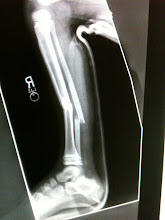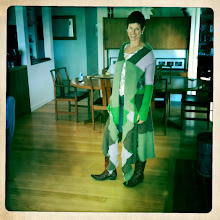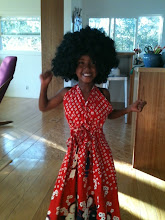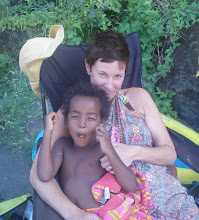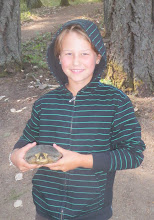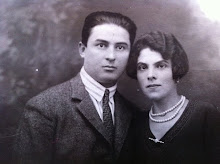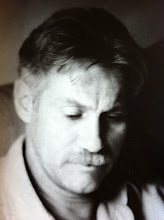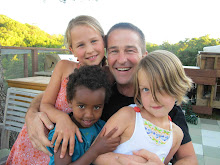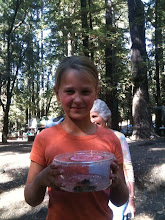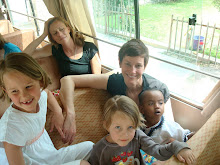Mae, whether by nature or nurture, is inclusive. She very rarely tells someone they can't play. There aren't many people she doesn't like. And while she and Lana can sometimes get into it (they are so close in age), she is an excellent big sister to Mihiretu. She helps him put on his shoes, she assists in constructing MegaBlock towers, she holds his hand in parking lots.
We've talked about adoption since Mae was born. Our grand plan was to have two biological kids and then, if we were feeling ambitious, adopt. And what do you know? This was actually a plan that saw reality.
When Mae was about three or four, she told me that she'd like to adopt a boy from Africa, then a girl from China, then I should have another baby from my tummy, then another from India, and so on. I asked her, shakily, how many kids she was envisioning. She said ten thousand. Probably the biggest number she could think of.
With the advent of Mihiretu, we've all learned that the actuality of a new child is a lot livelier than the idea of one. In one way or the other, metaphorically or literally, he's kicked each one of us in the rear. Not that that's wholey a bad thing. He's just so much more than we imagined. He, combined with our rather disastrous move to San Jose, has made us adventurous Caprons a little gun-shy. A bit humbled, perhaps. Maybe we can't slay every dragon that comes our way. Maybe sometimes we won't find the pot of gold at the end of the rainbow. Not that Mihiretu is a dragon or ungolden. If fact, a golden dragon is pretty much a pitch-perfect description of him. He's just brought us firmly out of fantasy. At least for awhile.
I asked Mae this morning if she's still interested in adding kids to the family. She laughed and said that maybe she "could survive another two" but no more. Amazing to me, and lovely really, that she still has the chutzpah for another two. I know I don't. Though talk to me in a couple years. I seem to have amnesia when it comes to difficult periods with small children.
Wednesday, March 31, 2010
Sunday, March 28, 2010
My Ride
I drive a minivan. A white Toyota Sienna.
It wasn't always this way. Until fairly recently, I was a die-hard Prius fan. We bought ours in 2006, the first year of the popular second generation model. We were the first on our street, if not for miles around, to drive one. Back in the days when people asked you if you had to plug it in.
I have no religious preference but when I'm forced to state one, I say "member of the Utilitarian Church." For that reason, the Prius fits me perfectly. It's small, which we utilitarians, who only want exactly what we need, adore. It stores a surprising amount for its size. We've gone on many vacations with our craigslist red canoe strapped to the roof, bikes racked on the back, the hatch piled to the ceiling with sleeping bags, American Girl dolls, blow-up Hello Kitty floaties, reusable Trader Joe bags of organic groceries and giant Ikea bags of swimsuits, sundresses and flip-flops (take that, Louis Vitton). And of course, with the Prius, I would zoom by the gas station day after day. I got a little nervous every time I filled up because it wasn't routine. At stop-lights, I could glance sidelong at those blond pony-tailed Marin mommies in their black Range Rovers and feel so pleased with myself. What are you doing for the earth, lady? Except killing it? Those lovely ladies might have been putting out smog, but I was putting out smug. Some call the Prius the "Pious" with good reason.
The Prius was the first new car we ever bought. After much discussion, we chose silver, the most utilitarian of colors. Within a year of our purchase, Marin was overrun with silver Pree-eye (if the plural of octopus is octupi and the plural of alumnus is alumni...). I felt like the single penguin amongst thousands in the Gary Larson cartoon singing "I gotta be me". We put a yellow, happy face ball on our antenna, which helped. For our friends, that tiny bit of sunny happiness became emblematic of our family, the signal they could find us at Peri Park or the Good Earth health food store. That scraped-up ball, which Ben had found discarded in a parking lot, became so important to our identity that when it was lost at the car wash, I left a my number and an impassioned plea with the manager. I got a call hours later that an employee had fished it out of a nearby canal. The ball, metaphorically, was mysteriously lost in our first days in San Jose. For all I know that sweet little guy jumped off at the Marin County line. WIth it, we left a critical piece of ourselves behind.
When we decided to adopt Mihiretu, I spent hours googling how to get three car seats across the back of a Prius. I bought him the slimmest of seats and eased the girls seats towards the sides. After some strategic shimmying and a triumphant shove to close the door, I knew I could keep my car.
When Mihiretu arrived, it became clear I had overlooked an important element. The kids, quite literally, were scratching each others eyes out. They would emerge from a ten minute ride to the market with blood oozing from their cheeks and throats. I started trimming their nails daily and tactically, they switched to pinching. Throwing caution to the wind, I had Mae ride shot-gun on short rides around town. The injuries were reduced but the cacophony of bellowing, singing, shrieks of "Mine!" and Dan Zane blasting on the stereo ("Louder, Mama, louder!") in that tiny cabin was deafening. I kept earplugs and advil within arm's reach.
We lived, for awhile, in denial. On our move day, tearfully driving away from all that was familiar and loved in Marin, Julia Andrews on the stereo, singing, at high decibels, "I Have Confidence" (because, boy, did I need it), getting lost in the seemingly identical strip-malled, six-lane boulevards trying to find the new house, all the while the kids trying to do each other in behind me, was something of a low point.
When all five of us would escape to the hippie haven of Santa Cruz on weekends, I took to sitting in the back between Mihiretu and Lana to minimize the brutality. The wings of the car seats would crowd my shoulders and I couldn't quite get my hips between the bases at the bottom. I would get lacerated, walloped, jabbed and assaulted with high-pitched squeals. Ben reported that, in the rear-view mirror, I made the most pitiful picture.
We rented a Sienna one weekend for a drive up to Marin. Each child was in their own four-foot diameter bubble of peace. We put on a Lemony Snicket audio book and shifted the sound to the rear. The girls listened happily in silence. Mihiretu fell asleep. Ben and I, hallelujah, had a moment to chat.
And so here I am. I live in San Jose. I, like the two other families on our cul-de-sac with young children, own a late model Sienna. I pull up at the stop-light and there's really nothing I can think as I look around at the other giant cars but greetings, sisters. And, yes, while the minivan is maybe the ultimate in the utilitarian family car, my vanity is taking a bit of a hit. It doesn't really fit my self-image as a MLF. But man, I'll fucking take it.
It wasn't always this way. Until fairly recently, I was a die-hard Prius fan. We bought ours in 2006, the first year of the popular second generation model. We were the first on our street, if not for miles around, to drive one. Back in the days when people asked you if you had to plug it in.
I have no religious preference but when I'm forced to state one, I say "member of the Utilitarian Church." For that reason, the Prius fits me perfectly. It's small, which we utilitarians, who only want exactly what we need, adore. It stores a surprising amount for its size. We've gone on many vacations with our craigslist red canoe strapped to the roof, bikes racked on the back, the hatch piled to the ceiling with sleeping bags, American Girl dolls, blow-up Hello Kitty floaties, reusable Trader Joe bags of organic groceries and giant Ikea bags of swimsuits, sundresses and flip-flops (take that, Louis Vitton). And of course, with the Prius, I would zoom by the gas station day after day. I got a little nervous every time I filled up because it wasn't routine. At stop-lights, I could glance sidelong at those blond pony-tailed Marin mommies in their black Range Rovers and feel so pleased with myself. What are you doing for the earth, lady? Except killing it? Those lovely ladies might have been putting out smog, but I was putting out smug. Some call the Prius the "Pious" with good reason.
The Prius was the first new car we ever bought. After much discussion, we chose silver, the most utilitarian of colors. Within a year of our purchase, Marin was overrun with silver Pree-eye (if the plural of octopus is octupi and the plural of alumnus is alumni...). I felt like the single penguin amongst thousands in the Gary Larson cartoon singing "I gotta be me". We put a yellow, happy face ball on our antenna, which helped. For our friends, that tiny bit of sunny happiness became emblematic of our family, the signal they could find us at Peri Park or the Good Earth health food store. That scraped-up ball, which Ben had found discarded in a parking lot, became so important to our identity that when it was lost at the car wash, I left a my number and an impassioned plea with the manager. I got a call hours later that an employee had fished it out of a nearby canal. The ball, metaphorically, was mysteriously lost in our first days in San Jose. For all I know that sweet little guy jumped off at the Marin County line. WIth it, we left a critical piece of ourselves behind.
When we decided to adopt Mihiretu, I spent hours googling how to get three car seats across the back of a Prius. I bought him the slimmest of seats and eased the girls seats towards the sides. After some strategic shimmying and a triumphant shove to close the door, I knew I could keep my car.
When Mihiretu arrived, it became clear I had overlooked an important element. The kids, quite literally, were scratching each others eyes out. They would emerge from a ten minute ride to the market with blood oozing from their cheeks and throats. I started trimming their nails daily and tactically, they switched to pinching. Throwing caution to the wind, I had Mae ride shot-gun on short rides around town. The injuries were reduced but the cacophony of bellowing, singing, shrieks of "Mine!" and Dan Zane blasting on the stereo ("Louder, Mama, louder!") in that tiny cabin was deafening. I kept earplugs and advil within arm's reach.
We lived, for awhile, in denial. On our move day, tearfully driving away from all that was familiar and loved in Marin, Julia Andrews on the stereo, singing, at high decibels, "I Have Confidence" (because, boy, did I need it), getting lost in the seemingly identical strip-malled, six-lane boulevards trying to find the new house, all the while the kids trying to do each other in behind me, was something of a low point.
When all five of us would escape to the hippie haven of Santa Cruz on weekends, I took to sitting in the back between Mihiretu and Lana to minimize the brutality. The wings of the car seats would crowd my shoulders and I couldn't quite get my hips between the bases at the bottom. I would get lacerated, walloped, jabbed and assaulted with high-pitched squeals. Ben reported that, in the rear-view mirror, I made the most pitiful picture.
We rented a Sienna one weekend for a drive up to Marin. Each child was in their own four-foot diameter bubble of peace. We put on a Lemony Snicket audio book and shifted the sound to the rear. The girls listened happily in silence. Mihiretu fell asleep. Ben and I, hallelujah, had a moment to chat.
And so here I am. I live in San Jose. I, like the two other families on our cul-de-sac with young children, own a late model Sienna. I pull up at the stop-light and there's really nothing I can think as I look around at the other giant cars but greetings, sisters. And, yes, while the minivan is maybe the ultimate in the utilitarian family car, my vanity is taking a bit of a hit. It doesn't really fit my self-image as a MLF. But man, I'll fucking take it.
Wednesday, March 24, 2010
German Lesson
The family next door is German. Sonja and Reiner emigrated to the U.S. about fifteen years ago, and while all three of their children were born here, they, unlike many first generation Americans, not only understand their mother tongue but choose to speak it as well. They even go so far as to have tiny, endearing, German accents.
They are a great family. We are extremely lucky to have landed next to them. All afternoon, every afternoon, the six kids (their three and our three) traipse from one backyard to the other, in and out of screen doors, up and down the cul-de-sac.
Emily, who's nine, and Mae are particularly well-suited. Both athletic and no-nonsense, they happily race bikes, climb trees and chase Ballsy for hours without conflict.
Yesterday, they were stationed in Emily's apple tree eating crackers. Mae tells me that's their official four p.m. snack location. They've rigged a rope and bucket pulley system to ferry their various culinary delights. Yesterday, Matilda, who's four and a force of nature, stood under the tree demanding that they share. You don't want to keep food from Matilda.
Emily told Matilda, in German, that the crackers tasted like broccoli. Matilda, though a equal opportunity consumer of almost any kind of caloric item, is not a fan of vegetables.
Mae, ever curious, repeated the sounds that Emily had made. Emily almost fell out of the tree laughing.
"You just said that these crackers taste like grandma!"
They are a great family. We are extremely lucky to have landed next to them. All afternoon, every afternoon, the six kids (their three and our three) traipse from one backyard to the other, in and out of screen doors, up and down the cul-de-sac.
Emily, who's nine, and Mae are particularly well-suited. Both athletic and no-nonsense, they happily race bikes, climb trees and chase Ballsy for hours without conflict.
Yesterday, they were stationed in Emily's apple tree eating crackers. Mae tells me that's their official four p.m. snack location. They've rigged a rope and bucket pulley system to ferry their various culinary delights. Yesterday, Matilda, who's four and a force of nature, stood under the tree demanding that they share. You don't want to keep food from Matilda.
Emily told Matilda, in German, that the crackers tasted like broccoli. Matilda, though a equal opportunity consumer of almost any kind of caloric item, is not a fan of vegetables.
Mae, ever curious, repeated the sounds that Emily had made. Emily almost fell out of the tree laughing.
"You just said that these crackers taste like grandma!"
Tuesday, March 23, 2010
Little Women
I'm a big believer in babysitters. Since the girls have been infants, I've had a stream of ladies of all ages coursing through our house. Sometimes, probably, my vetting process has been a bit lackadaisical. I've used teen-aged girls for a last minute date that have resulted from polling my current sitter, then her friends, then her friends' friends and if I'm desperate enough, her friends' friends' friends. That unfamiliar girl would, like everyone else, get a five-minute rundown of the bedtime routine before Ben and I sailed out the door. If the girl was taller than the kids and appeared to be breathing, she had herself a job. I'm very trusting of the universe. Some would fault me for this but as a way of life, I prefer it to the alternative.
I've regretted that liberal policy exactly once. We hired one of the girls' preschool teachers, a woman who dressed like she was fourteen but turned out, shockingly, to be forty. She was great with the girls, a bit stunted with the adults (again, she seemed fourteen) but we figured this was one of our safer choices. In this litigious age, it isn't easy to get past the background check when applying for a teaching job.
This woman, I'll call her Melissa, babysat for us at least once a week for months. Finally, once she had proven herself capable, we decided to go away for the night. We went to Monterey, had a most excellent time walking the shore, slurping down seafood and counting sea otters and returned to find the girls happy, well-fed and reasonably clean.
A couple of weeks later, Melissa was missing from preschool. One day, two days, a week, two weeks. Finally, I heard through the mommy channel that she was in the psych ward and wouldn't be returning to work. While I felt for her, having experienced depression myself, the load of responsibility I had given her made me a little nauseous.
While Melissa was clearly a mistake, there have a been a number of girls and women that have been gems. We met Monica when she was fifteen, volunteering at that very same preschool. She was our regular girl for four years until she left for college this fall. Even with the great distance, we still see her. She came to San Jose and helped one week when Ben was gone. We expect to see a lot of her this summer.
Kelly is a new acquisition. We poached her from the neighbors. She's with them every weekday afternoon but come evenings and weekends, she's ours. She's twenty-three, an undergrad at San Jose State.
When I first starting hiring these young babysitters, I was afraid of them. Teenagers, probably because they're so intimidated, are intimidating. They're not kids, they're not adults, what do you do with them? How do you talk to them? And about what? I was haunted by my own awkward adolescence. I think I was, like Monica, like Kelly, mature and able to talk to adults quite easily, but I remember that teenage world, so anarchic, so sarcastic, so hurt.
The girls broke me of that fear. As I got to know Monica, it became clear there was a full person in residence. Yes, young, but a complicated, interesting, intelligent being. One with whom I had a lot in common. One who, actually, reminded me of my own nascent self all those years ago. Over the years, we've covered all the topics, both on her end and on mine, and found a lot of shared territory.
Kelly is probably the person I can most easily talk to in San Jose. Yes, she has bleach blond hair, isn't afraid of eyeshadow and drives a sparkling white muscle car, not my usual type. But she gets my jokes, unlike the vast majority of the Silicon Valley population. We can chat easily about jeans, how to quickly lose five pounds, and dive into heavier topics, trauma at the hands of boys, losing a loved one. It struck me one afternoon while we were watching the kids ride bikes around the cul-de-sac, chortling over her report of her uncle's custom t-shirt ("BITCHASS BITCHES!!"), that had I actually conceived a child with that greasy playwright in college, that kid would be about Kelly's age. It was both a little alarming (where did the time go?) but also kind of comforting (you find your friends where you find your friends - end of story).
On the surface, Monica and Kelly appear to have little in common but their age and gender. Kelly is blonde, bubbly, a sexy petite tom-boy who's passionate about baseball. Monica is tall, dark, intellectual, a bit broody, and looks like a young Tina Fey. They have one vital statistic in common. They both lost a member of their family when they were teenagers. Monica, her mom, when she was thirteen. Kelly, her brother, when she was fifteen. I lost my father when I was twenty-three, certainly no teenager but still young, still not fully formed. I think these losses lent each of us a certain gravity, something you don't generally see in young people. It gave us a terrible understanding of the cycle of life. We saw that, oh my god, bad things could happen. Bad things could happen to people we really needed. That shared experience, maybe, is what has really bonded me to them. Until you've lost someone you can't do without, you're something of a virgin. You haven't reached your depth. It's reassuring to find other sullied souls.
And while these women have become my friends, they're also beloved by my children. These ladies clearly love being with the kids and the kids can feel that, can sense when someone's honestly interested in the newly-completed unicorn drawing, when someone really does want to see them hop on one foot. They know when they are being enjoyed instead of merely being attended as they enjoy themselves.
I love these two women. Maybe because I see myself in them. Maybe just because they're cool people and cool people of any age are, well, cool. I'm glad they got me past my ageism. And I hope they're in our lives a good, long time. I'd like to see them mother their own kids one day.
I've regretted that liberal policy exactly once. We hired one of the girls' preschool teachers, a woman who dressed like she was fourteen but turned out, shockingly, to be forty. She was great with the girls, a bit stunted with the adults (again, she seemed fourteen) but we figured this was one of our safer choices. In this litigious age, it isn't easy to get past the background check when applying for a teaching job.
This woman, I'll call her Melissa, babysat for us at least once a week for months. Finally, once she had proven herself capable, we decided to go away for the night. We went to Monterey, had a most excellent time walking the shore, slurping down seafood and counting sea otters and returned to find the girls happy, well-fed and reasonably clean.
A couple of weeks later, Melissa was missing from preschool. One day, two days, a week, two weeks. Finally, I heard through the mommy channel that she was in the psych ward and wouldn't be returning to work. While I felt for her, having experienced depression myself, the load of responsibility I had given her made me a little nauseous.
While Melissa was clearly a mistake, there have a been a number of girls and women that have been gems. We met Monica when she was fifteen, volunteering at that very same preschool. She was our regular girl for four years until she left for college this fall. Even with the great distance, we still see her. She came to San Jose and helped one week when Ben was gone. We expect to see a lot of her this summer.
Kelly is a new acquisition. We poached her from the neighbors. She's with them every weekday afternoon but come evenings and weekends, she's ours. She's twenty-three, an undergrad at San Jose State.
When I first starting hiring these young babysitters, I was afraid of them. Teenagers, probably because they're so intimidated, are intimidating. They're not kids, they're not adults, what do you do with them? How do you talk to them? And about what? I was haunted by my own awkward adolescence. I think I was, like Monica, like Kelly, mature and able to talk to adults quite easily, but I remember that teenage world, so anarchic, so sarcastic, so hurt.
The girls broke me of that fear. As I got to know Monica, it became clear there was a full person in residence. Yes, young, but a complicated, interesting, intelligent being. One with whom I had a lot in common. One who, actually, reminded me of my own nascent self all those years ago. Over the years, we've covered all the topics, both on her end and on mine, and found a lot of shared territory.
Kelly is probably the person I can most easily talk to in San Jose. Yes, she has bleach blond hair, isn't afraid of eyeshadow and drives a sparkling white muscle car, not my usual type. But she gets my jokes, unlike the vast majority of the Silicon Valley population. We can chat easily about jeans, how to quickly lose five pounds, and dive into heavier topics, trauma at the hands of boys, losing a loved one. It struck me one afternoon while we were watching the kids ride bikes around the cul-de-sac, chortling over her report of her uncle's custom t-shirt ("BITCHASS BITCHES!!"), that had I actually conceived a child with that greasy playwright in college, that kid would be about Kelly's age. It was both a little alarming (where did the time go?) but also kind of comforting (you find your friends where you find your friends - end of story).
On the surface, Monica and Kelly appear to have little in common but their age and gender. Kelly is blonde, bubbly, a sexy petite tom-boy who's passionate about baseball. Monica is tall, dark, intellectual, a bit broody, and looks like a young Tina Fey. They have one vital statistic in common. They both lost a member of their family when they were teenagers. Monica, her mom, when she was thirteen. Kelly, her brother, when she was fifteen. I lost my father when I was twenty-three, certainly no teenager but still young, still not fully formed. I think these losses lent each of us a certain gravity, something you don't generally see in young people. It gave us a terrible understanding of the cycle of life. We saw that, oh my god, bad things could happen. Bad things could happen to people we really needed. That shared experience, maybe, is what has really bonded me to them. Until you've lost someone you can't do without, you're something of a virgin. You haven't reached your depth. It's reassuring to find other sullied souls.
And while these women have become my friends, they're also beloved by my children. These ladies clearly love being with the kids and the kids can feel that, can sense when someone's honestly interested in the newly-completed unicorn drawing, when someone really does want to see them hop on one foot. They know when they are being enjoyed instead of merely being attended as they enjoy themselves.
I love these two women. Maybe because I see myself in them. Maybe just because they're cool people and cool people of any age are, well, cool. I'm glad they got me past my ageism. And I hope they're in our lives a good, long time. I'd like to see them mother their own kids one day.
Monday, March 22, 2010
Lana-isms
Lana has a way with words. Or perhaps a way with reinventing them.
Sunscreen, for a very long time, was sun-scream. Which could be interpreted either as the sun can make you scream, or a variation, "suns-cream", which also makes some sense.
Sometimes when we're out walking, we pause to pick and sip honeysuckles. At which point Lana invariably comments, "My honeyknuckle tastes so sweet."
Nipples, still, are "nibbles", which again, has some logic. Sometimes she encourages her dolls to nurse from her "nibbles".
For a long time, she said "titty" for "kitty" as in "I wuv titties. Big titties. Wittle titties. Soft titties. White titties. Bwack titties. All tinds of titties."
She is now a pro reader. But one night a year or so ago, before her skills were so polished, I eaves-dropped on her "reading" a book that she had memorized. It was an adoption book called "It's Okay to be Different". When she got to the page that says, "It's okay to be small", she read "It's okay to be mini-a-ture." "It's okay to eat macaroni and cheese in the bathtub", something she knows I don't agree with, got the stink-eye. When she read "It's okay to have different hair", she considered it for a good minute before she whispered, "Yes, that's okay."
One night I was making lamb stew. Lana ambled into the kitchen and asked what was for dinner. She was perplexed by my answer.
"But not like lamb the animal, right?"
I said that indeed, it was the animal.
"But that's so sad. A little baby lamb?"
I saw her point.
There was a period when the "Juno" soundtrack was in heavy rotation. Most of it probably not at all appropriate for children ("fuck Bush and fuck this war", etc.) but we were into it. One song goes, "If you want to kill yourself, remember that I love you." Lana would sing along but her version was, "If you want to cook yourself, remember that I love you." I try to remember that whenever I'm tempted to cook myself.
Sunscreen, for a very long time, was sun-scream. Which could be interpreted either as the sun can make you scream, or a variation, "suns-cream", which also makes some sense.
Sometimes when we're out walking, we pause to pick and sip honeysuckles. At which point Lana invariably comments, "My honeyknuckle tastes so sweet."
Nipples, still, are "nibbles", which again, has some logic. Sometimes she encourages her dolls to nurse from her "nibbles".
For a long time, she said "titty" for "kitty" as in "I wuv titties. Big titties. Wittle titties. Soft titties. White titties. Bwack titties. All tinds of titties."
She is now a pro reader. But one night a year or so ago, before her skills were so polished, I eaves-dropped on her "reading" a book that she had memorized. It was an adoption book called "It's Okay to be Different". When she got to the page that says, "It's okay to be small", she read "It's okay to be mini-a-ture." "It's okay to eat macaroni and cheese in the bathtub", something she knows I don't agree with, got the stink-eye. When she read "It's okay to have different hair", she considered it for a good minute before she whispered, "Yes, that's okay."
One night I was making lamb stew. Lana ambled into the kitchen and asked what was for dinner. She was perplexed by my answer.
"But not like lamb the animal, right?"
I said that indeed, it was the animal.
"But that's so sad. A little baby lamb?"
I saw her point.
There was a period when the "Juno" soundtrack was in heavy rotation. Most of it probably not at all appropriate for children ("fuck Bush and fuck this war", etc.) but we were into it. One song goes, "If you want to kill yourself, remember that I love you." Lana would sing along but her version was, "If you want to cook yourself, remember that I love you." I try to remember that whenever I'm tempted to cook myself.
Wednesday, March 17, 2010
The Lump
I found a small, pebble-like lump in my breast a couple weeks ago. I waited to see if it would change with my cycle and when it didn't, I went to see a gynocologist.
While I expected her to dismiss it as nothing, fibrous tissue, don't worry, instead she told me that a mammogram, an ultrasound and probably a biopsy was in order.
My appointment with the radiologist was set for the end of the week. Until then, I was left to face the idea of my mortality. And not my mortality at eighty, as I'd planned, releasing my last joyous breath in a sunlit room laying next to my husband who would, miraculously, expire at the same moment. No, this was imminent mortality, skinny, bald, wrapped in my own universe of pain, no longer able to reach out to my children. My father died that way. I don't recommend it.
Ten years ago, I would have been mourning all I'd miss if I died young (the experience of children, a long life with Ben, whatever creative path I might take). Tragic, certainly. But now, getting this news now, it was all about making things okay for my kids. I was not afraid for myself. Pain, a withering body, a lost future, I can take it. Grief and loss for my children, no way.
Ben came home early the day of my ominous visit to the doctor. I met him in the driveway and told him, half joking, that he had to marry someone really nice. Because that's my greatest fear. That firstly, my illness and death would scar the kids irrevocably, make them adults before they've had a chance to be children. And secondly, and this is even bigger, that there won't be anyone to mother them properly. That someone coming into their life in that role might not fully understand them, appreciate them, love them or at any rate, not like I do.
As I was thinking this, it struck me that that's what Mihiretu's birth mother must have felt as she lay dying. She must have looked at her son toddling around her hut and grieved for him in advance. She would know that she would leave him and he would go out into the world unshepherded, unprotected, unloved. And I realized that I was the person, this secondary person, to take over for her, to try to love that little guy like my own. And I cried for them. For both of them. Maybe for all of us, for Mihiretu, for his birth mom, for Mae, for Lana, for me, for Ben. For anyone walking through the world feeling unprotected and unloved. And it left me feeling how strongly, how fervently, I need to love Mihiretu. I need to laser him with love even if he's trying to deflect it. I need to do it for her. I need to it for him. And I need to do it for me, both because I adore him but also because I need someone to step in if, god forbid, I had to leave this project part way through. We, hopefully, form a web, we humans, that can catch those that need catching, even if they don't share our blood.
Today, after making small talk with a technician while she performed my mammogram and ultrasound (yes, three-year-old boys are crazy, aren't they and five-year-old girls are precocious and I totally agree that Montessori is a great approach), Dr. Patel came in to do a bit of ultrasounding herself. Within thirty seconds she said, "There it is. Yep, it's a cyst. And from this angle, look, you can see the plugged duct. Nothing to worry about."
And just like that I was among the living again. I could return to Ben in the waiting room, who hugged me hard and did a little jig. I could return to my kids, hold their faces in my hands and look into their eyes only with delight, only with optimism, and not with that terrible dread that I would have to leave them sometime far too soon.
It has been a long four days. Days of being barely there, lost in our imagined, horrifying future. But here's the thing. Today was the most beautiful day. Yes, it was gorgeous, eighty-degrees, almost-spring but it was also a day that I could take big deep breaths and know exactly how lucky I am. To have the chance, the pleasure of raising these kids, these three divine, maddening, entirely unique beings. To be a part of this world, this web. At least for awhile.
The brut
Things are vastly improving but in the act of mothering Mihiretu, there's something akin to being a battered wife. He keeps on doling out the punishment and I keep coming back for more.
He preferred Ben from the very beginning. I know that children adopted as toddlers often bond with one parent first and then, over time, bridge to the other. And I read a statistic that something like eighty percent of those kids choose the dad. I have theories on that. Traditionally, dads are more fun than moms. They engage in unpredictable play (tickling, tackling, chasing, etc.) whereas moms, generally, are more orderly in their approach. Also, these kids who have been orphaned or abandoned have usually been cared for by their mother or some other female caregiver. I loved mom, mom left, don't trust moms. And when I think of the situation in these terms, my heart opens to Mihiretu.
But. When I emerge from the bedroom in the morning and he, after an hour or two of dad time, greets me with an outstretched tongue and a chorus of "Mama, poo poo," it's a little hard to take the long view. When Mihiretu throws himself on the floor in grief after Ben's departure for work and I put a hand on his back that is slapped away with a scowl, my heart, propped open by my own will, feels a little bruised.
In any other relationship, if I was consistently getting that kind of feedback, I'd find someone else to love. This whole coming back for more again and again after getting met with anger and disdain, I stopped doing that by the time I was twenty-one. If he was a boyfriend, he would have been dumped months ago, and I would have started working an Al-Anon program.
But he's my kid. And, in my rational moments, I know that if I can keep a steady hand and keep approaching him with kindness, eventually, little by little, he'll let me in. If I can prove to him that I'm not leaving, that Ben's not leaving, all this behavior, or most of it, will fall away. And the only way to do that is with time.
So for now, when Mihiretu's doling it out, I'm taking it. And imagining better days.
Tuesday, March 16, 2010
Bon mots
Sometimes it is just the things they say.
Tonight on the way to dinner at an Ethiopian restaurant, Lana said, "Mihiretu, do you remember Africa?"
Mihiretu said, "Yup."
"Where everyone was brown?" Lana said and thought a moment. "Except us?"
One day, again in the car (why does all the funny stuff happen in the car?), Ben was looking at a real estate magazine (as Ben is wont to do) and he commented on a piece of property. It was somewhere over a million.
From the backseat we heard, Mae say, "That's a lot of money."
Lana replied, "Yep, sure is."
There was a brief pause and then Lana said, "I farted."
One day I was explaining to the kids why I wanted to do something (I can't remember what) one way instead of another. I said the other way would be a pain.
To which Mae said, helpfully, "In the ass."
Sunday, March 14, 2010
Family Resemblance
My friend, Julia, who also has an adopted child, was remarking how biological parents love to discuss the many ways in which their children resemble them. I've noticed how much, indeed, it does come up. And for an adopted child (and adoptive parents), every time those likenesses are mentioned in casual conversation, it can expose a big gaping hole - where did I come from and who came before. It can be lonely-making, I would think, most everyone else knowing their history, both recent and far in the past, and the adopted kid often knowing very little about their biological genealogy.
But here's the thing. Mihiretu kind of looks like us. I know, I know, he's black, we're white. But when we received the first photograph of him, it was shocking how many people remarked that he looked like a Capron. There are some similar features. Like Lana, he has a high forehead and wide-set eyes, a classic Ethiopian trait. I've long said, even before we considered adopting from that country, that Lana is an Ethiopian in the negative. And his body, in it's length and narrowness, with it's bird bones, is rather Lavoie, my side of the family. And, probably most of all, the spark of heat and curiosity shining in his eyes as he smiles, I believe he shares with us.
But even more than appearance, Mihiretu acts like a Capron. Caprons, and now this is Ben's side, are dynamos. They are physically gifted, a master at virtually any sport they try. They have incredible energy, which can be aimed in either constructive or destructive directions. Ben, for the brief period he used alcohol and drugs in his teens, wrecked two cars and fell out of a three-story window. Then, at seventeen, he got sober and has channeled that chi into building an impressive career, and, if I do say so myself, an excellent family. Mihiretu, like Mae and Ben and Ben's sister and dad, are cut of the same cloth. You know they're either going to do very well or crash and burn spectacularly. (Lana is a Lavoie. She, like me, couldn't be more happy puttering around the house, organizing small items and creating little pieces of art. We are quieter. We need less exercise. We like clothes.)
And Mihiretu, like Ben, is all about bikes. Ben works in the bike industry and he rides religiously. He wins U.S. Cup and World Cup races. Like Ben, when Mihiretu rides, the bike is an extension of his body. He can direct it with nuance and precision. Ben is convinced he's going to be the first black man to win the Tour de France. With his Ethiopian light frame and endurance genes, Ben for a teacher and all the bikes he could ever need, it seems like the perfect equation.
And while Mihiretu fits with us, we are also fitting to him. Because of him, we had a life-changing journey to Ethiopia. We eat Ethiopian food and read books about the country. We talk about Ethiopia a great deal - how they do things, what time it might be there now, etc. And we are, by necessity, more fly-by-the-seat-of-our-pants with him around, less controlled, more spontaneous. Definitely more noisy.
I'm finding that families, not just ours, resemble each other, whether or not they share the same blood. When I first met the aforementioned Julia it took me awhile to guess her daughter was adopted. Ella is of mixed race so it probably should have been obvious. But she shared the same fire I could see in her mom and dad. They were an unmistakable trio.
It's adoption legend that the right family always find the right child and vice versa . And there's no doubt that Mihiretu matches us in some elemental way. Thinking that this is all destined is comforting. In my rare moments of feeling like this all has been a gigantic mistake, I'll remember Ben's mom saying that Ben was exactly like this at three. And he turned into someone I like so I'm hoping the chances are good that Mihiretu will also funnel that very special combination of Mihiretu spice and Capron mojo into a fine and very compelling adult.
Little fish
Mihiretu was in the bath not long ago, and having bored with filling and pouring out the stacking cups, he moved on to exploring his penis. Bent over almost in half, he pulled back the foreskin once, twice, three times before he could finally get a good look at the pink little something underneath. It kept slipping in his grasp until at last, after many tries, he got a good grip. After a moment of close examination, he sat up triumphantly and, with a thrill of discovery, shouted, "Fish!"
Yesterday Ben and Mihiretu had some rare time alone together. They rode on Ben's bike to downtown Willow Glen, our little city within the big city of San Jose, to get some lunch. Standing in the middle of a long line at the bagel shop, Ben tried to figure out what Mihiretu might like. While he'll eat pretty much any real food you put in front of him (fruit, vegetables, meat), he's not the biggest fan of bread. He has, in the past, enjoyed lox so Ben asked, "Mihiretu, would you like fish?"
He looked at Ben in great consternation, then looked down at his crotch. Putting his hands on his zipper, he asked wonderingly, "Fish?"
The crowd, who really is always watching, laughed in unison.
Thursday, March 11, 2010
Magic Bus
Day Four of our adoption week in Addis Ababa. Our entire travel group, consisting of six families working with our same adoption agency, was on the Partridge Family era bus the agency used to ferry adoptive families from place to place. This was one of the last outings without our new children.
Our travel group consisted of a number of couples entering into parenthood for the first time, a couple of families there to pick up their second child , and us. Us consisted of Ben, myself, Mae, Lana and our friend, Megan. We had heavily debated bringing the kids with us (Pros: adventure of a lifetime, it would include and invest them in the adoption, we'd miss them so damn much if we left them home. Cons: Thirty hour journey there and back, exposure to disease and abject poverty, sometimes they can be a real pain in the ass and we'd have to concentrate, damn it) and finally settled on bringing them and my friend of twenty-five years, the Mary Poppins of Ethiopia, Megan.
While for the majority of other families this was, I suspect, the last stop of a long ride on the infertility train, and therefore, both a joyous time and one freighted with all the disappointment and agony that had come before, it was for us, for our whole merry crew, a much more light-hearted affair. No, adoption wasn't a lark and this week of meeting Mihiretu and beginning to incorporate him into our life was challenging and sometimes scary but we had, with every option open, chosen adoption, chosen Ethiopia, chosen a toddler. We were fresh from the land of Yes. This also wasn't our first rodeo in the parenting department. We were seasoned and felt confident (even if that confidence would get shaken later on).
And we so very much outnumbered the other parties, both in size and in energy. The girls, of course, were in constant motion, sobbing, giggling, leaping, tripping, sobbing again. And Megan and Ben and I have all known each other since we were fourteen. There is a certain ease and, sometimes, a certain corresponding youth/immaturity that can go with that. Megan and I, particularly, could be found trying on each other's clothes, discussing gluten-free options at dinner or gossiping about boys over a covertly shared cigarette. Megan and I are both tall, rather willowy, and always interested in a good outfit. This all, I imagine, could be a bit alienating for our fellow travelers, most of whom haled from the midwest. California girls can be so...Californian.
We had just climbed back on the bus after an afternoon of shopping in Addis - one of the few non-adoption related activities on our schedule. Mae had been complaining of a headache. She, like me when I was her age, is susceptible to migraines. She was pale, her pupils were huge. I knew we were in trouble.
As we trundled along through the clogged and stricken streets of Addis back to the guest house, each passenger in his or her own exhausted reverie, I heard an ominous belch. I turned behind me to see Mae projectile vomiting all over herself, the seat, the floor and Megan. I vaulted the seat while Ben emptied a plastic bag of our purchases. He handed me the bag just as I arrived beside Mae to place the bag under her chin, where it quickly filled.
We were seated at the front of the bus. Megan told me later than when she glanced back, she saw shocked, silent, bloodless faces.
"Preview of coming attractions!" I shouted over my shoulder, as I used Mae's soiled t-shirt and a mini bottle of the ever-present hand-sanitizer on the seat and the floor. I heard a few wan chuckles.
The next day we were scheduled to visit the region to the south where our children had been relinquished. Each adoptive family would, hopefully, meet the person who had left the child at the local orphanage. Usually that person was a member of that child's birth family. It was expected to be a very emotional day.
Early that morning, we boarded the bus. We had left the girls with Megan, as it was a long drive and they couldn't be in the meeting. The bus was cool, everyone dozed and watched the countryside.
We arrived at noon. We disembarked. We had our meeting. I won't describe what happened there as it's really not mine to describe. It belongs to those children. I will say the we were different people when we got back on the bus than we left it. It's a little like witnessing a first-time mother's water break and then visiting her the next day in the hospital. For you, it's only been twenty-four hours. For her, it's been a lifetime. She's traveled an incredible distance and arrived at a deeper self.
As we dragged our deeper selves back onto the bus, we were hit with the stench of vomit. Apparently, the cursory wipe-up I had done the day before had been the only effort at restoring the bus to it's pre-Mae state. The bus had now been sitting in the African sun for two hours, windows rolled up to protect our backpacks from the impoverished locals.
I watched as each wrung-out person climbed the bus stairs. The smell would hit them, register and then they would, with closed eyes and a drop of their head, accept it resignedly. They had been through too much that day, that week, to put any energy into combating that horrible stink.
The bus rolled, and the wind blew through the open windows. We put our hankerchiefs over our noses and mouths. We drove back to Addis in silence.
A couple days later, when our newly adopted children were in our custody in the guest-house, the playing field was evened out a bit. Everyone was now noisy, not just us. Everyone was struggling to find their feet with these new kids, including us. Megan and I didn't have time for gossip or diets or cigarettes. In those couple remaining days, we cohered as a group. We had walked through, and were continuing to walk through, the same fire. It was forging us, no matter how different we seemed, into similar shapes. We were parents of children of Ethiopia, of the world - not of our own individual bodies. We firmly, at least for the moment, understood how we were part of the greater whole. We would carry the weight of that, the specific weight of that, back into our lives, along with these children. These beautiful children, who, if all went well, would now one day have the opportunity to puke on a bus, loving parents at the ready with comforting words and a plastic bag, the birthright of any American child.
Wednesday, March 10, 2010
Family Jewels
While we were waiting to pick up Mihiretu in Ethiopia, we got a medical report that he had one undescended testis. When I discussed it with our pediatrician (the wondrous Nelson Branco, also our friend), he said it sounded like a case of a retracted testis, not an undescended one. Fully undescended testes require surgery and could later affect fertility and increase the odds for testicular cancer. Retractile, on the other hand, are testes that are sometimes dropped into the, er, sac and sometimes pulled up into the body cavity. That, according to Nelson, was not such a big deal.
While we were in Ethiopia, however, the doctor associated with our adoption agency, a very stern, seemingly self-important (and I'm sure overworked) Ethiopian, claimed that both testes, not just one were at issue, and that they were fully retracted. He ordered immediate surgery as soon as we were stateside.
Once home, Nelson advised us to check Mihiretu's jewels while he was in the bath. Warm water, apparently, relaxes the muscles and drops the testes. If we could "milk" them down (poor boy), then we were in good shape.
Every time I checked him in the bath, I could find two happy little critters. Every time Ben tried, he found an empty nest. After months of debate, we finally went and saw a pediatric urologist.
Doctors appointments with Mihiretu have historically been mayhem. Whether he's the patient or one of his sisters is in the hot seat, the small exam room is always a recipe for maximum volume and frenetic activity. He jumps off lab tables, searches drawers, flings cotton balls, you name it. I anticipated the worst.
Once there, however, Mihiretu was surprisingly helpful. He happily took off his shoes before peacefully stepping on the scale and stood calmly to get his height measured. He dutifully trotted after the nurse to the exam room, then stopped suddenly in a panic, crowing, "Shoes!", thinking we'd left them behind. When I displayed his shoes in my hand, he laughed in relief and continued his march down the hall.
Somehow, miraculously, we only waited a moment for the doctor to join us and when he did, Mihiretu sat for him calmly while this stranger palpated his privates. After a total of three minutes in the exam room, the doc pronounced him just fine. I was so relieved. Months of anxiety, or at least testicle-related anxiety, fell away.
"Wow, Mihiretu," I said as I was putting on his shoes. "You might just give me grandbabies."
He smiled as he trooped out of the room.
He shouted over his shoulder, "I like it - baby!"
I swear
I believe in swearing. I take great pleasure, when I'm with Ben or other close friends, in really letting it rip. When I became a parent, this began to pose a problem. Suddenly, instead of "Oh my god", I felt obliged to say "Oh my goodness". "Damn" became "darn" and "shit" became "shoot". "Fuck" never became "frick" because, for some reason, that particular compromise drives me apeshit (or should I say apeshoot). And while my girls were very small, this censorship felt right. They seemed too vulnerable to be exposed to rough edges of any kind. I saved my potty mouth exclusively for the grown-ups.
As they grew, as they became people with opinions, people with whom I could have thoughtful conversations, I stopped editing myself quite so much. And when they hit three and it was all about toilet talk, I felt hypocritical proclaiming certain words "bad". I imagine my love of swearing is part and parcel with my love of language. Using the f-word as an adverb can sometimes get your point across like nothing else. And I feel that parenting is about teaching your kids how to navigate the adult world they'll one day enter. They need to know what's coming or the teenage years are going to be shocking for everyone, parents included.
When the girls starting talking about poo and nothing but (no pun intended), it seemed to make sense to limit the use of those words to the bathroom. You could talk about poo if you were going poo. And if you really just needed to say "Poo, poo, poo, pee, pee, pee" and giggle, the bathroom seemed as good a place to do that as any.
But when they got a little older and could handle a bit of nuance, I made this rule. They could swear. They could use any word they wanted. But it was all about knowing when it was appropriate. They couldn't use those words to intentionally hurt someone's feelings (i.e. "You bitch, you stole my Barbie!") and they couldn't swear anywhere outside the house and if they were swearing in the house, it had to be just immediate family present. Grandma, the reverend, might not delight in this language as much as we do.
Of course we've had our slips. Mae at five, at a birthday party, being told her turn on the trampoline was over and mumbling resignedly as she jumped to the floor, "God damn it", sounding for all the world like me after the third glass of spilt milk in a single meal. And later that same year, after a harrowing two hours in an urgent care exam room with my Alzheimer-stricken and highly irritated mother, encapsulating the experience as "fucking awful". The truth is, she was right. And, lately, of course, Mihiretu yelling, "Dammit!" at any possible opportunity.
But on balance, at least for our family, our peace-making with foul language seems to be working, at least for now. And, hallelujah, when we get all the way to school and realize we forgot the lunches, I can say, "Shit". Not meanly, not loudly, not accusatorily, but with the utterance of that word, a tiny bit of pressure escapes and stops me before I blow.
Tuesday, March 9, 2010
Blind Side
There was once a time when watching the Oscars was a big event for me. I looked forward to it for weeks, cleared my calendar for the day, and nibbled on otherwise forbidden Oreos and low sodium cheese puffs. I liked to watch the show alone so I could drink in every detail. I was living in L.A. then, I was an actress. Billy Bob Thornton's win for "Sling Blade" was a very big deal.
The Oscars don't loom so large these days. On Sunday, the kids circled while we alternately watched and fast-forwarded the first half. Ben and I had seen probably two of the nominated movies. We made fun of gigantic dresses and inarticulate recipients.
By 9:30, the kids were long ago in bed and Ben and I were running out of steam. We zoomed to the last few prizes. The best actress category was one I had some investment in. I'm in love with Meryl Streep. Have been since I was like twelve. Sometimes in yoga class when the instructor talks about a personal guru, I think, ah yes, Meryl. She is everything I once hoped to be, both personally and professionally. When I was sixteen, I read in Life magazine that she was born on June 22nd. My birthday. Of course. Ben and I promise each other that if we ever get a female dog, we'll name her Meryl Streep.
I had actually seen the movie she was nominated for this year. As a friend put it, it was two movies, one brilliant, the other mediocre crap. I don't think I need to say one she was in. I didn't fully expect her to win. She's nominated every year for a genius performance in one less than genius movie or another. But I was, as always, rooting for her.
When the time came and Sandra Bullock was named the winner, Ben and I were yelling at the TV. We didn't see the movie for which she won, something about a Southern white woman taking in a black teenager, but really, Sandra Bullock? That's the best the movie industry could do this year?
As she took the stage and began her speech, I started to hate her a little less. While we were heckling her largish bottom, she was honoring the other women nominated, by name, in detail. She purported to love Meryl Streep maybe as much as I do.
And then she reached out of the television and took me by the shoulder. She dedicated her Oscar to the mothers in the world raising children to whom they did not give birth. I started crying so suddenly and violently, it was a little like a bout of food poisoning.
We paused the program and Ben sat next to me and held my hand. I explained how very isolated I've been feeling. There is no one else in my daily sphere doing what I'm doing. I don't really know anyone who's adopted a toddler, let alone a sometime Tasmanian Devil who draws stranger's gazes not just for his outrageous behavior but also for the color of his skin.
Shortly after we adopted Mihiretu, we moved from our very liberal enclave in Marin County to San Jose. It's conservative here. Yes, still Northern California, but a whole lot closer in world-view to the MidWest than where I come from. We are the only transracial family as far as the eye can see. Sure, there are biracial families; parents of different ethnicities with kids of mixed race. But there are no white parents with adopted black children. Surprisingly, not even any white parents with adopted Asian children, at least not that I've seen. I often feel like people don't know what the hell to make of us. It's rare a stranger looks me in the eye. I end up feeling invisible.
And here, now, though my fellow mothers say, "Oh, god, yeah, my son at three, what a nightmare", and while I know they mean so well, the fact that I have a three-year-old boy is just the very tip of my experience with Mihiretu. He's a three-year-old boy who is grieving, who has had far too many homes in the last eighteen months, who is pushing every button he can, literally (the TV, the microwave, the light switch, the car radio, the dishwasher) and figuratively (taunting, hitting, scratching, breaking every rule we set down), testing us to see if we'll leave, too.
But when Sandy acknowledged me and my kind, I suddenly, momentarily, felt included. That yes, the unusual thing that I'm doing, other people are doing, too. And that it is hard. Harder than I ever predicted. It's hard to be ignored by strangers. It's harder to drag myself out of bed at two in the morning to comfort a child who then pushes me away screaming. It's a strange, often lonely road I've taken and for a moment I felt like someone was walking with me.
Sandra Bullock closed by again thanking her "lover, Meryl Streep" and I watched her walk off stage with a feeling of great satisfaction. Is she the best actress in America? Probably not. Does it matter? Not to me. Not this time.
Monday, March 8, 2010
Ballsy
A couple of months ago, a cat sauntered into our living-room. It wasn't our cat. And he didn't walk through any open door that we could see. Strangely, he had come from the direction of the bedrooms, where there is no access to the outside.
He was a half-grown kitten, cement grey. Miraculously, when Mihiretu ran at him shrieking, he didn't run away. He ran toward Mihiretu with a leap, ready to play, something we'd never seen, or expected to see, from any small creature. "Wow," we said. "Brave."
The kitty had no collar and it quickly became apparent that he was still intact, so to speak. That he was very much a he. "Can we keep him?" the kids asked immediately. Ben and I groaned. We have two cats already. Two cats that pee on carpet and beds. One once took a poop on Ben's shoulder while he was sleeping. More cats we do not need. More living things of any variety, actually, be they goldfish, houseplants, even sea monkeys, would overwhelm us at the moment.
I assured the kids that the kitty didn't look skinny. When we offered him our cat food, he turned it down. Certainly he belonged to a neighbor. They called over the fence to the kids next door. Soon our backyard was full of children under ten, dragging bits of yarn, throwing super-balls, engineering homemade cat toys, all of which this amazing new kitty chased happily.
"What should we call him?" the kids asked. I noted that he was a particularly daring cat, seemingly afraid of nothing. Ben laughed and said, "Given that and the fact he hasn't been fixed, we should call him 'Ballsy'". The kids ran back outside, shouting, for all our rather conservative neighborhood to hear, "Ballsy! Come here, Ballsy!"
In the months since, Ballsy has become an institution. Every afternoon is spent searching for him, chasing him, being chased by him, urging him into trees or out of trees, turning our tribe of sometimes sparring children into one Ballsy-enthralled team. Mae and her friend next door, Emily, have decided he's "royalty" and that he's their "Mom, what's that thing? Like at school? With the bulldog? Oh, yeah, mascot."
His true home is still a mystery. Is he some sort of Jesus cat come to make peace among warring factions? Some sort of benevolent shapeshifter? An angel taking the form of a little grey kitty so that I can have thirty uninterrupted minutes to make dinner? Whoever he is, however he got here, I'll take it. As Mihiretu says, "I like it, Ballsy."
Sunday, March 7, 2010
Mihiretu
Mihiretu is the Ethiopian Dennis the Menace. He flushes bath plugs down toilets (he did that, twice, actually, before we wised up and chained the plug to the bathtub). He turns the refrigerator to the coldest setting so we wake up to frozen half-and-half. He adjusts the clock radio to staticky Mexican polka and shoves up the volume. He drags his sticky hands across every window of our house, which is an Eichler and all windows. He got us kicked out of the Winchester Mystery House because his delighted high decibel shrieks made the teenage tour guide forget her spiel. He is, indeed, so loud that we have earplugs stashed in every room of the house and, most importantly, in the car. His first real English phrase was "Damn it!" - probably - and don't tell the social worker - because he was hearing it so much (as in "Damn it, Mihiretu, you flushed the plug down the toilet again!"). He chases cats and sisters, he pegs tennis balls at unsuspecting adults with incredible precision. Lately, he's taken to saying, "Poo-poo, Mama". Not as in "I have to go poo-poo, Mama." As in "You are poo-poo, Mama."
Up until we brought him home last May, my experience of mothering was limited to girls. Two energetic, often willful girls, but girls all the same. Mihiretu is all boy. When we're driving, he urges, "Fast, fast, Mama!" When we stop at a red light, he yells, "Go, Mama, go!" until it finally turns green. He likes our babysitter in part because she has a muscle car. He'll report after a trip to the library, "Kelly, car, fast!" He has an ardent love of school busses. Every time he spots one, he'll shriek, "Bus, Mama, bus, bus, bus, bus, BUS!" until I acknowledge emphatically that he has indeed seen a bus. He learned to ride a bike without training wheels well before he was three. He jumps off curbs and ramps, he balances his feet on the crossbar. At two a.m., he mumbles in his sleep, "Bike?"
And yet, under all the activity, all the noise, there is a soft little heart. When the lovely, huggy, Japanese lady next door drives down the culdesac, he runs to her driveway and shyly waits for an embrace. He loves his dad passionately, has since the first moment he saw him. All day, every day, he asks, "Dada work?" When I say Dad is indeed at work, he asks, "Plane?" and I assure him that, no, today Daddy is not on a plane, he'll be home at dinner time. He's taken to proclaiming "I like it" when something meets his approval. As in "I like it, candy", "I like it, pizza," and most importantly, "I like it, Dada". Sometimes when, in a rare moment of stillness, I find him in my lap, I'll whisper, "I love you, Mihiretu". Nine times out of ten, he'll wriggle away and say emphatically, "I like it, Dada" but once in a while, he'll lean in a bit and whisper, "I yuv you, Mama".
Subscribe to:
Posts (Atom)



